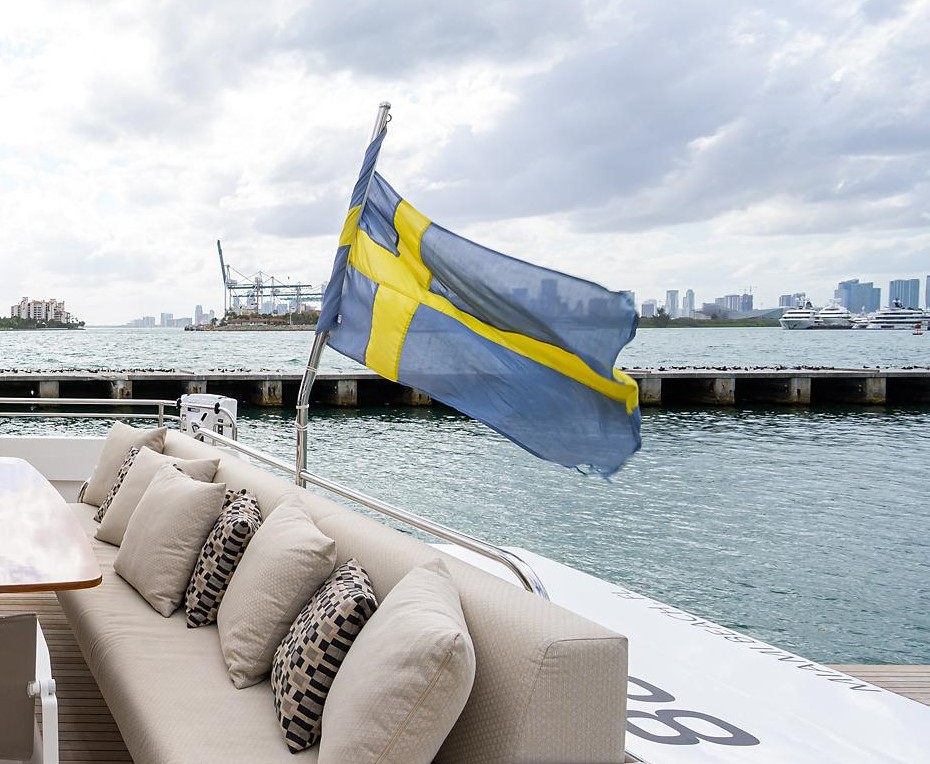
September 28th, 2021

While cruising through listings, you spot a yacht that is everything you’ve been looking for: a 54.4 foot beauty with shining style and peak performance to match. You’re already dialing the yacht broker’s number when a disclaimer at the bottom of the page catches your eye: “Not Available for Sale to U.S. Residents While in U.S. Waters.”
An antiquated law from the early 1900s requires “foreign-flagged” vessels, like the one you’ve set your sights set on. to enter U.S. Customs and pay a hefty Duty and Import tax (totaling 1.5% of the boat’s value) before they can be listed for sale to American buyers.
While cruising permits allow foreign-flagged vessels to enjoy untaxed pleasure trips through the turquoise-jeweled waters of Florida’s Keys or slip into your local boatyard, these permits place limitations on commercial activities like buying and selling.
Despite these limitations, many sellers choose to pursue an offshore sale in hopes of attracting an international buyer and boosting their profits by avoiding required U.S. import taxes. But this means that U.S. nationals cannot even touch the teak of a for-sale foreign-flagged vessel when she’s in American waters without risking the wrath of U.S. Customs.
But if you’re an American eyeing a foreign-flagged beauty, fear not. Here’s what you need to know about buying or selling a foreign flagged boat offshore:
BUYING FOREIGN-FLAGGED VESSELS
Pursuing an offshore sale will give you access to far more inventory. And though you might not be able to experience the smooth glide of that foreign-flagged, soon-to-be-yours yacht of your dreams in your home waters, that doesn’t mean you’re buying blind.
As the sale proceeds, your offer will be subject to a sea trial held in international waters (at least 3 miles out from the U.S. shoreline). If the trial is successful, you’ll complete the sale of the boat while still at sea.
Though this process can feel confusing to first-time offshore boat buyers, a well-qualified and experienced yacht broker can make it easily navigable.
SELLING FOREIGN-FLAGGED VESSELS
If you’re the owner of a foreign-flagged vessel and already have a cruising permit in hand, there are a few key reasons you might choose to list it as an offshore sale:
However, listing your boat as an offshore sale comes with two major downsides:
Though crafting a careful plan for an offshore sale might take some extra effort, being smart about how you market your boat (or asking an experienced yacht broker) can maximize your sale by targeting the wants and needs of international buyers.
Attracting an international buyer will do good things for your bottom line: you’ll be able to steer clear of import-tax fees.
FOREIGN TRADE ZONES
During the Great Depression, the United States realized they needed a plan to stimulate the American economy and stimulate international boating companies’ interest in domestic activity and investment. Their solution was to establish Foreign-Trade Zones (FTZ), the U.S. equivalent of what are internationally known as free-trade zones.
Foreign-trade zones are good things for American buyers. Within FTZs, you can move and display vessels, perform repairs, and add value to boats without being subject to U.S. Duty or Import taxes and fees. Boats are also held under the safekeeping care of the U.S. Customs and Border Protection.
Because of this, FTZs offer incentive for premier foreign companies to stimulate their commercial growth in the U.S.
In 2017, the first U.S. marine free-trade subzone was opened at Lauderdale Marine Center, a stone’s throw away from our Ft. Lauderdale offices. This subzone offers American buyers an opportunity to come aboard potential boat buys without making the 3-mile trek outside of U.S. waters or seeing costs skyrocket to cover the tax bill.
Good news all around: if you’re in the market to buy a boat (or entering the market to sell one), you don’t need to be scared off by “Not Available for Sale to U.S. Residents While in U.S. Waters.”
We have six offices, 45 brokers, and decades of experience supporting buyers and sellers across the globe through offshore boat sales.
Our knowledgeable team has facilitated local and international boat sales since 1945, connecting buyers and sellers of all yacht sizes to their dream vessels. We’re experts in transnational sales, ready to answer your questions and make your offshore purchase or sale possible, smooth, and concern-free.
We make it easy to stand at the helm of that foreign-flagged yacht that caught your eye, or easily hook a hefty profit on your next offshore sale.